Does Microdosing Enhance Neuroplasticity?
It’s easy to find glowing accounts of microdosing. On psychedelic-related subreddits and forums, on social media, on blogs, and in real-life psychedelic circles, many people report incredible, life-changing, and wide-ranging benefits from taking tiny, sub-perceptual doses of psychedelics (typically psilocybin mushrooms and LSD). Despite reports of persistent depression fading away, not needing psychiatric medications anymore,…
View Post



